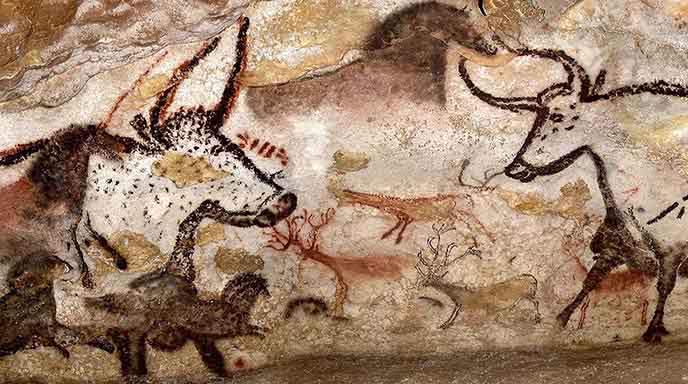Want to access Spanish-friendly resources, and dig into history, science, math, or philosophy? Perhaps, you want to double-check your critical thinking processes? Let’s explore exciting Open Educational Resources (OER) and educational websites. I have all of these websites bookmarked and easily accessible on my computer. Why? They broaden my knowledge and awareness of the world in ways my traditional education did not. Explore them as powerful enhancers for your own learning and teaching.
Let’s start with a website that connects us to culture and science.
Website #1: CaixaForum
Are you learning Spanish or do you have students who might appreciate access to Spanish media resources? You definitely need to tune in to CaixaForum – a free, no-cost source of Spanish media. No matter what you may be learning about, you will find many fantastic resources in Spanish here.
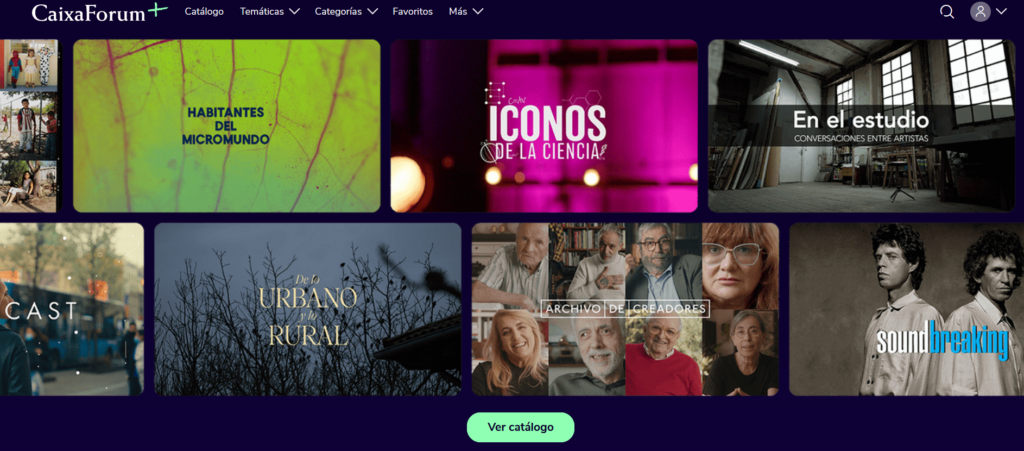
What is CaixaForum+? This is a question I asked myself when I first stumbled upon this wealth of media content. You will find a bilingual description of the CaixaForum+ below:
CaixaForum+ es la plataforma online de la Fundación “la Caixa” que permite acceder a contenidos audiovisuales y podcast de diferentes temáticas: música, artes visuales y plásticas, artes escénicas, cine, historia y pensamiento, ciencia, arquitectura y diseño o literatura.
CaixaForum+ is the online platform of the “la Caixa” Foundation that allows access to audiovisual content and podcasts on different topics: music, visual and plastic arts, performing arts, cinema, history and thought, science, architecture and design or literature.
CaixaForum+ offers its Spanish content via the web, as well as through iOS and Android apps for mobile.
Website #2: World History Project
“Only a few know how much one must know to know how little one knows,” says Werner Heisenberg. After reading a few history books, I have found myself realizing how little I know about history. Now, teachers and students can learn about world history. They can do so through the OER’s World History Project (WHP).
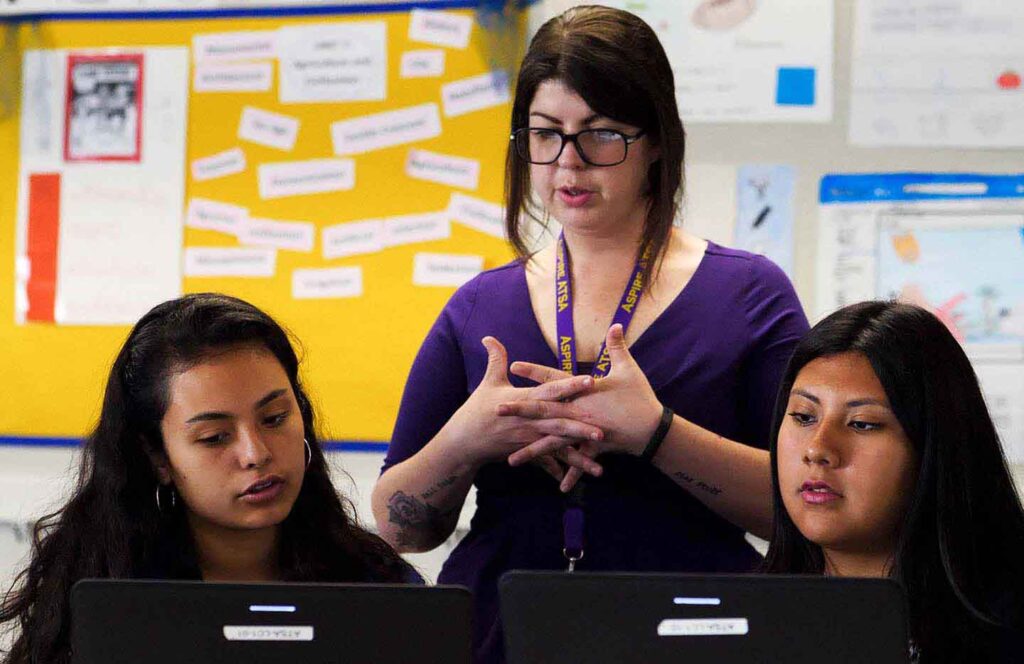
This website offers four courses for teaching world history to high school students, including:
- WHP Origins to the Present. This course begins at the origins of human existence through the birth of the modern world.
- WHP 1200 to the Present. Start right before the Columbian Exchange and the first transoceanic connections to globalization.
- WHP 1750 to the Present. This one starts at the Industrial Revolution, exploring key transformations.
- World History Project AP. This one is designed for Advanced Placement (AP) World History students.
These courses are free to everyone, and you can save them for offline use. Accounts of history make me curious. It’s an area that was sorely treated in my education, which focused on writing, science, and mathematics. In the midst of reading Roxanne Dunbar-Ortiz’ book, “An Indigenous Peoples’ History of the United States,” I look forward to seeing how OER Project’s offering differs in its account.
Website #3: MediaWise
“The first thing you should do when coming across a suspicious meme or video is to check your emotional reaction. Do you feel anger, fear, disappointment, sadness, or anxiety? You might be looking at misinformation,” says Pride David. He goes on to say:
Posts that trigger emotion are designed to get people to share them, so it’s best to pause, take a deep breath and do some fact-checking first. (Source: Is This Legit? A Media Literacy Skills Recap, The Poynter Institute).
Want to hone your critical thinking? Take advantage of a free, one-hour lesson plan via PBS Learning Media. It offers media literacy skills and student activities. You can find a wealth of resources (viewed over 53 million times!) via The Poynter Institute’s MediaWise initiative. It includes:
- International Fact-Checking Day 2023 resources
- Training and Resources
- Teen Fact-Checking Network
- MediaWise Ambassadors
Catch them on YouTube as well.
A complementary resource is The Thinking Shop. Let’s take a look.
Website #4: The Thinking Shop
It’s so easy for humans to make mistakes in thinking. That’s why it’s important to be aware of logical fallacies and cognitive biases. Consider the following assertion:
Want to see a ten percent jump in academic achievement, and record growth over the course of a year? One thing you can do, according to a study designed by a famous academic, is this:
“To test the effects of pleasant imagery on motivation, employees were shown images of baby animals and beautiful nature scenes for their first five minutes at work.
What might this mean? Showing students and teachers pleasant images is a great way to increase motivation. It also improves productivity.
But does it? The quoted paragraphs (adapted from source) above contain what the source article calls, “logical fallacies.” Logical fallacies present in the quoted text above include:
- Appeal to authority. Who is this “famous academic?” It implies that the argument is research-supported.
- False inductions. This is where you infer there is a relationship between two things that happened, but there may not be. Showing pleasant images to students may or may not be linked to increased academic growth.
There are many other logical fallacies. Unless you become familiar with how human brains can fall into these traps, you may fall for fake news and information. One way to avoid that is to refresh your memory of Logical Fallacies. The Thinking Shop offers a poster for logical fallacies and cognitive biases.
You can buy the poster, or get the free downloadable version at no cost. It is available, along with all their posters, via a Creative Commons copyright as a download.
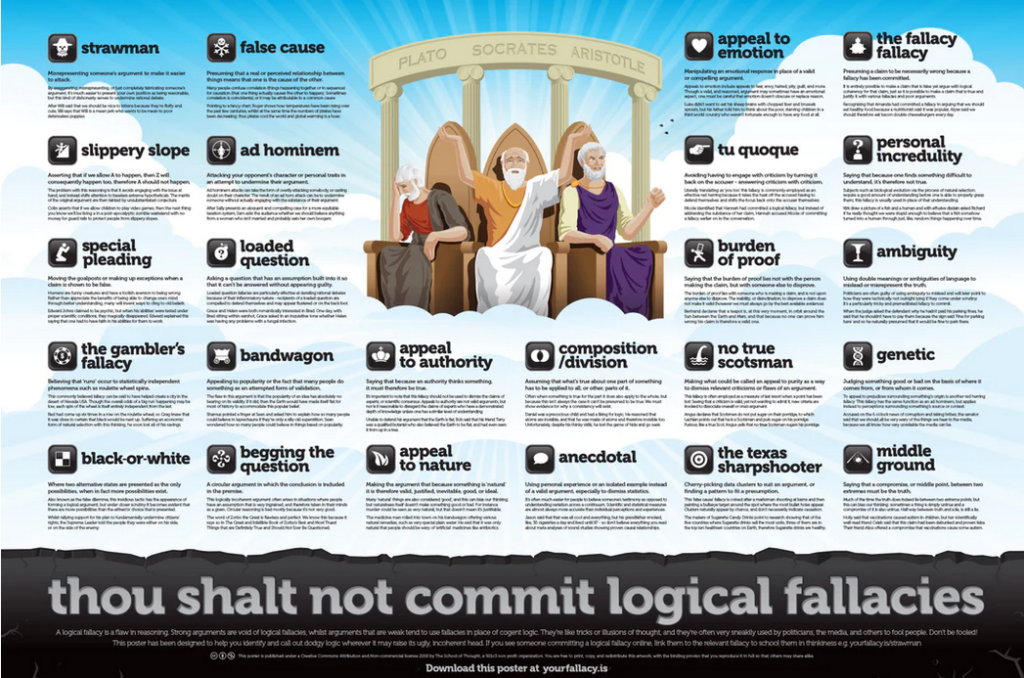
What’s more, also available in the downloads are bonus game cards for logical fallacies. Once you’ve read these, you will want to keep them handy to check your thinking. I plan to buy the posters and put them in my office so I can review them while writing.
Finally, you may also be interested in the burgeoning tabletop game Conspiracy by Urban Games, LTD.
For the players of Conspiracy, putting themselves into the shoes of fictional characters bent on destroying society with nefarious plots can demonstrate how unlikely these complex, hidden systems (5G, chemtails, anti-vaccine conspiracies) really are. (source)
A print copy of the game is available online. Tempting to play and discover your fallacies and biases in action.
Website #5: LibreTexts
Dump those conventional paper-based books for ebooks. Well, not so fast. Curious about open-access texts under constant revision by students, faculty, and outside experts?
The LibreTexts mission is to unite students, faculty and scholars in a cooperative effort to develop an easy-to-use online platform for the construction, customization, and dissemination of open educational resources (OER) to reduce the burdens of unreasonable textbook costs to our students and society.
LibreTexts’ Mission
Deepen your awareness of areas of knowledge, like art, composition, history, languages, philosophy, and more. You will find a wealth of online books available for post-secondary learners.
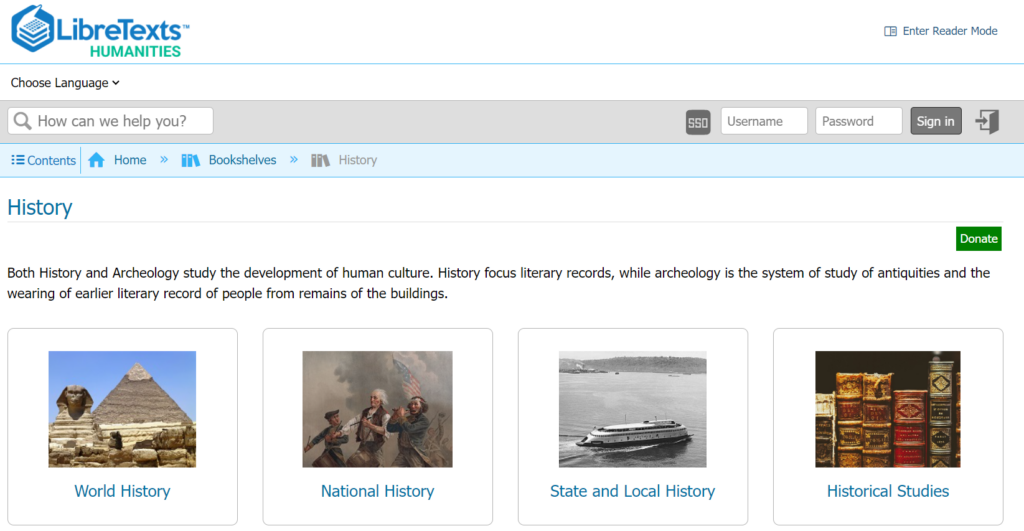
For example, world history does the following:
World history examines history from a global perspective. It looks for common patterns that emerge across all cultures. World historians use a thematic approach. That approach has two major focal points. Those include: integration (how processes of world history have drawn people of the world together) and difference. The latter reveals how patterns of world history show the diversity of the human experiences.
The LibreTexts Humanities website comes with BeeLine Reader and Readability integrated into it. What’s more, you can access a K12 Education Library.
Ready to try out these free websites and resources? I hope you do, and once you have, let us know how it goes in the comments.

